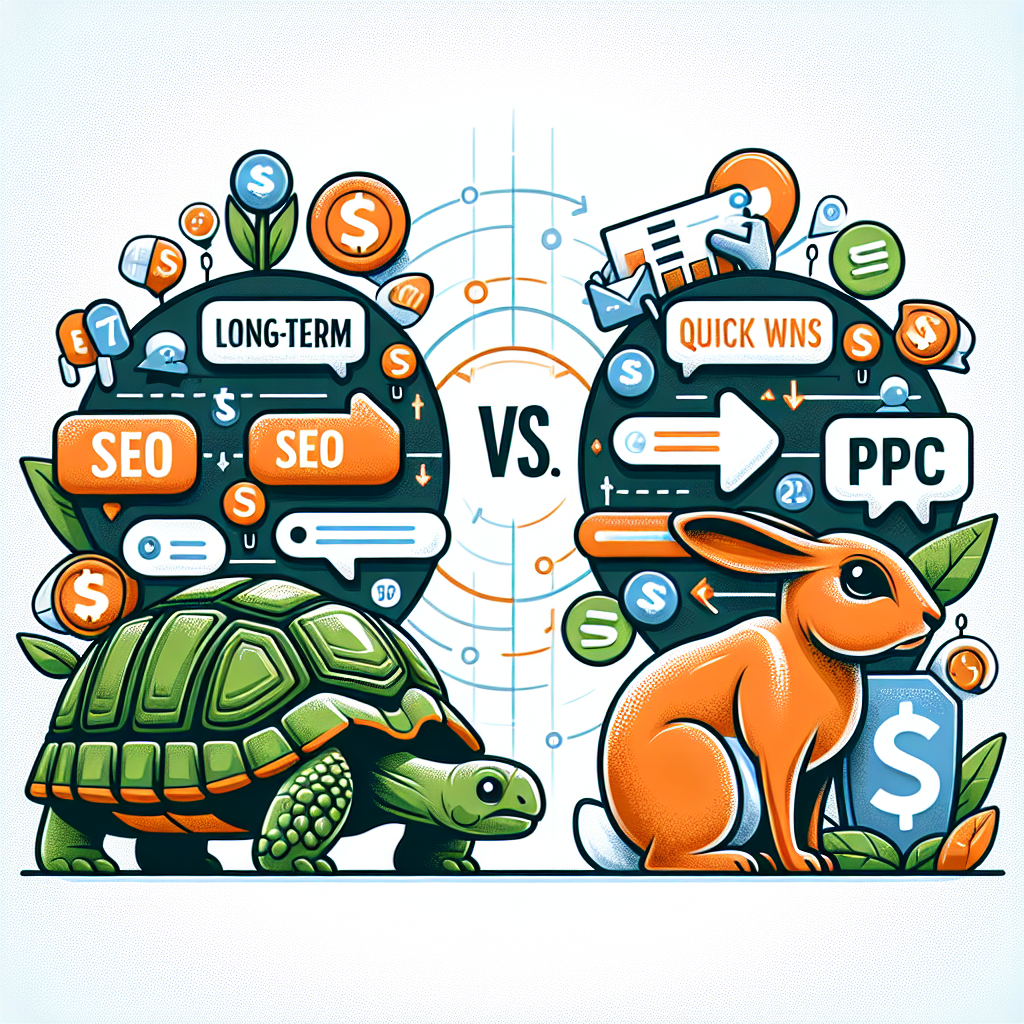In the digital age, businesses are constantly navigating the advertising landscape to find the most effective way to reach their target audience. Two powerful methods have emerged at the forefront: Search Engine Optimization (SEO) and Pay-Per-Click (PPC) advertising. Both have their merits, but when it comes to long-term success versus quick wins, how do you choose the right strategy for your marketing needs?
In this article, we’ll delve into the strengths and weaknesses of SEO and PPC, offering guidance to help you make the best decision for your business.
Understanding SEO: The Power of Organic Reach
What is SEO?
Search Engine Optimization (SEO) is the practice of enhancing your website’s visibility on search engines through organic means. This involves optimizing website content, improving site architecture, and gaining backlinks from reputable sites to increase your ranking on search engine results pages (SERPs).
The Long-Term Benefits of SEO
-
Cost-Effectiveness: While SEO requires an initial investment of time and resources, it yields long-term benefits. Unlike PPC, where you pay for each click, organic traffic can continue to flow without constant ad spend.
-
Sustainable Traffic: As your website gains authority in your niche, it will attract users consistently, leading to a steady stream of visitors and higher conversion rates over time.
- Trust and Credibility: Users tend to trust organic search results more than paid ads. High rankings can enhance your brand’s credibility, making potential customers more likely to engage with you.
Challenges of SEO
- Time-Consuming: Achieving significant rankings usually requires weeks or even months of strategic planning and implementation.
- Algorithm Changes: Search engines frequently update their algorithms. This can affect your rankings, requiring you to adapt your strategy regularly.
Exploring PPC: The Power of Immediate Results
What is PPC?
Pay-Per-Click (PPC) advertising is a model of internet marketing where advertisers pay a fee each time their ads are clicked. Google Ads and Bing Ads are leading platforms for this kind of advertising.
The Immediate Benefits of PPC
-
Instant Visibility: Once your ads are live, they can appear at the top of search results almost immediately, attracting traffic right away.
-
Granular Targeting: PPC allows businesses to target specific demographics, locations, and even times of day, ensuring your ad reaches the most relevant audience.
- Measurable Results: With PPC, you can track conversions, clicks, and overall ROI in real-time, enabling you to optimize campaigns for better performance quickly.
Challenges of PPC
- Costs Increase Over Time: As competition grows for keywords, bidding prices can increase, making PPC a costlier option if not managed properly.
- Ad Fatigue: Over time, your audience may become desensitized to ads, leading to click-through rate (CTR) decline and necessitating continuous revitalization of ad content.
Comparing Long-Term Success and Quick Wins
Balancing Between SEO and PPC
Both SEO and PPC have unique advantages and drawbacks, often leading businesses to ponder which is better suited to their needs. Here’s how to determine the right path for your marketing efforts:
-
Set Clear Goals: Are you seeking long-term growth or immediate results? Knowing your goals can help you choose the right approach. For sustained growth, SEO is advantageous; for instant sales, PPC may be better.
-
Assess Your Budget: If you have limited funds, prioritize SEO, as it can yield organic traffic with minimal ongoing expenses. However, if you can invest in immediate ad spend, PPC can produce quick results.
- Understand Your Audience: If your audience relies heavily on social media and digital content, blended strategies—using both SEO for organic reach and PPC for quick targeting—may work best.
A Hybrid Approach
Many modern marketers recommend a hybrid approach, leveraging both SEO and PPC strategies. By using PPC for immediate sales and SEO for long-term visibility, you can create a balanced marketing ecosystem.
Integrating SEO and PPC for Maximum Impact
-
Keyword Research: Use PPC data to inform SEO keyword strategies. Identify high-performing paid keywords and optimize your website for those organic searches.
-
Creating Quality Content: Focus on producing content that enhances your organic rankings while also supporting your PPC campaigns. Quality content strengthens your brand’s authority.
- Landing Page Optimization: Optimize landing pages for both organic reach and PPC traffic, ensuring that users have a seamless experience regardless of how they arrive at your site.
Conclusion: Making Your Choice
Choosing between SEO and PPC ultimately depends on your business objectives, budget, and audience. While SEO offers long-term benefits and the potential for sustainable growth, PPC provides immediate visibility and valuable insights into customer behavior. The most effective marketing strategies often incorporate both methods, ensuring that you benefit from quick wins while also laying the groundwork for long-term success.
By understanding the strengths and weaknesses of each approach, businesses can tailor their marketing strategies effectively, leading to increased visibility, higher conversion rates, and ultimately, a successful brand presence in the digital marketplace.


